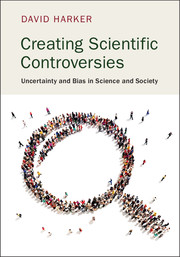Introduction: scientific authority and the created controversy
Published online by Cambridge University Press: 05 October 2015
Summary
The word science can conjure up for us a variety of ideas and images. It can whisk us back to cluttered classrooms, furnished with tall stools and long benches, Bunsen burners, and glass-doored cupboards stocked with assorted paraphernalia. The word might bring to mind the names and faces of famous scientists: Newton, Faraday, Hawking, Curie, Galileo and Mendel all jostle for attention, but ultimately are crowded out by a mental image of Freud and his cigar, Einstein and his untamed hair, or Darwin and an almost equally untamed beard. Maybe it rouses important scientific concepts, activities or instruments, the atom, star gazing, the test tube or the microscope. Perhaps we imagine a pristine laboratory, a young technician dressed in an immaculate white coat, scrutinizing a vial of blue translucent fluid for reasons unknown.
Science is ubiquitous. Its boundaries are fuzzy, its range bewildering. Distinctions have been drawn between different types of science, natural versus social, hard versus soft, historical versus experimental, and so on. Disagreement reigns over whether economics is science, whether anthropology is science, whether history is science. Creation science calls itself science, but many call foul. Politicians have suggested – what sounds thoroughly reasonable – that policy should utilize sound science and eschew junk science. Scientific discoveries are reported in the media; scientific concepts are utilized in novels, film and television. Science is popularized and demonized. It offers explanations of our most commonplace observations, but in terms that are peculiar and hard to comprehend. Scientific developments are integral to some of society's most remarkable achievements, but also some of our most horrifying tragedies. Science is both utterly familiar and an immediate source of controversy and debate.
The fact that science occupies an extraordinarily important place within modern society makes it important to think more carefully about what science is. A great deal of scientific research is conducted in service to issues of public safety and perceived public need, is funded by taxpayers, and is overseen at least to some extent by political systems. It is sensible to consider whether the research being pursued is of genuine value, of greater value than research that doesn't get funded, and whether the degree of political oversight is appropriate. The technological fruits of scientific labours often give rise to hard questions about the ethics of warfare, human reproduction, food production, energy development and more.
- Type
- Chapter
- Information
- Creating Scientific ControversiesUncertainty and Bias in Science and Society, pp. 1 - 18Publisher: Cambridge University PressPrint publication year: 2015



